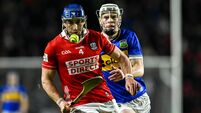Moscow celebrates wartime victory
The heads of government joined Russian President Vladimir Putin on Red Square for a lavish military parade celebrating the 60th anniversary of the Allied victory over Nazi Germany.
Fighter jets screamed high over the square, streaming smoke in the white, blue and red colours of Russia's flag. Soldiers belted out patriotic wartime songs, and Mr Putin emphasised the Soviet Union's sacrifice in a speech during a pageant that recalled the days of communist might.














